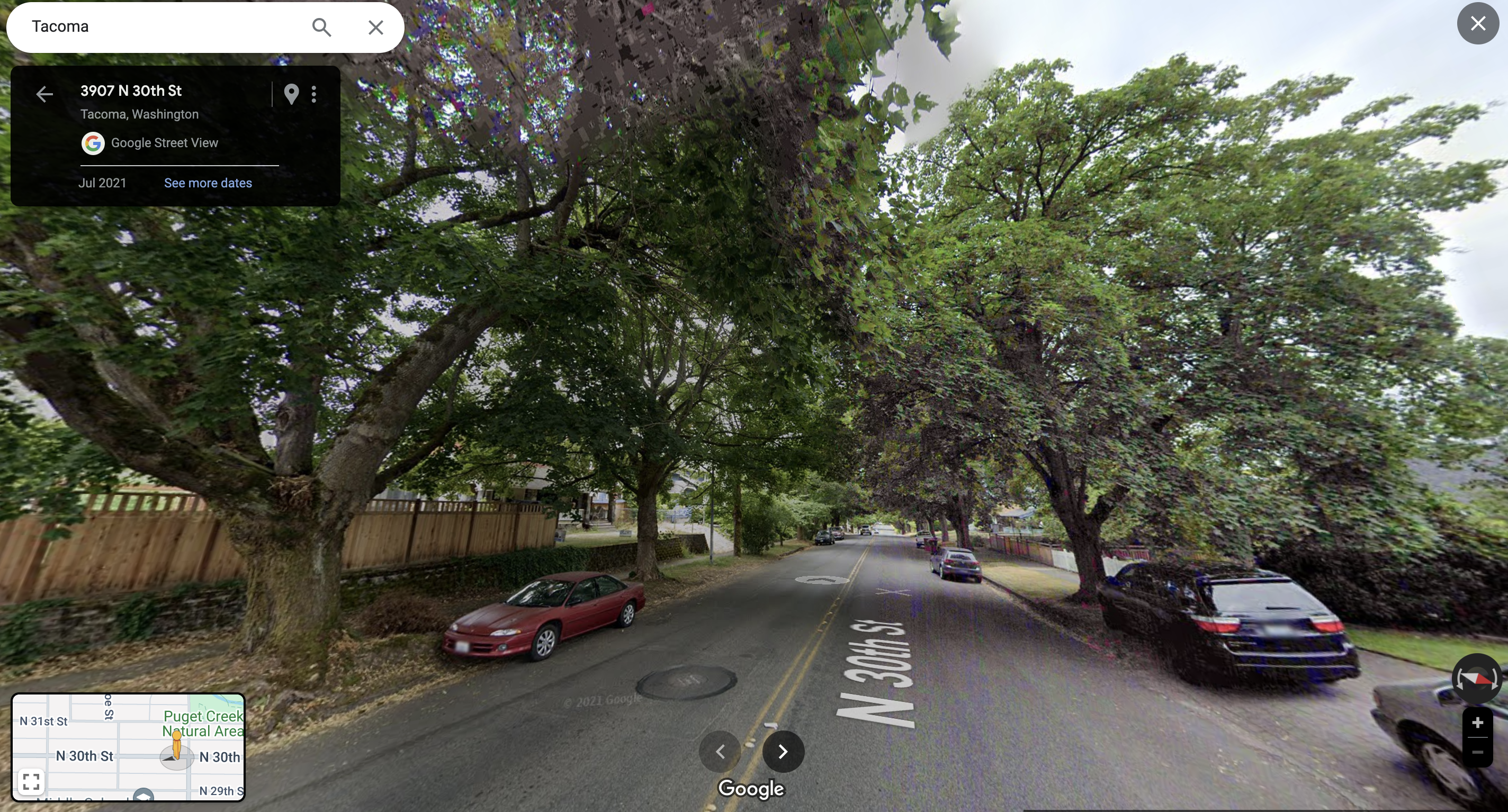We’ve written this article because there’s a lot of bogus information online about evicting squatters and other non-tenant residents. Much of this bad info seems to be written by property managers and realtors who confuse adverse possession with the laws relevant to active squatter situations. It’s disappointing what companies do for search engine optimization.
Here will dispel some of the myths in these articles and address the relevant legalities of evicting (or otherwise removing) a squatter in Washington State.
“Squatters rights” AKA adverse possession
If you’re dealing with a squatter in a house or apartment building then adverse possession probably doesn’t apply.
Adverse possession (also known as “squatter’s rights) is the process by which a trespasser gains legal title to a property by using it as their own for 7-10 years. Adverse possession normally arises along contested boundary lines or roadways. It’s incredibly rare that an entire house or apartment is adversely possessed.
If you want to learn more about adverse possession, we’ve written a separate article here. This article is about dealing with recent squatters living in habitable spaces.
Is your resident a tenant, a squatter, or another kind of non-tenant?
Definitions are important in the law. If you’re a landlord trying to evict a residential tenant, you should stop reading now. Instead, you’ll want to read our guide to evicting a tenant in Washington State.
The definition of “tenant” is ambiguous (unfortunately)
Washington’s definition of a residential “tenant” is broad. Under the Washington Residential Landlord-Tenant Act, only the following list of “living arrangements” do not constitute a residential tenancy:
- Residence in a hotel, motel, or other transient lodging pursuant to RCW 19.48.010.
- Residence in an institution where medical, religious, or educational services are provided.
- Occupation pursuant to a purchase agreement or condemnation, for example where a buyer occupies a property prior to closing, or a seller occupies it after closing.
- Farm leases and other housing incidental to a job. For example, worker housing, or farm leases where there is a single-family farmhouse incidental to the farm lease.
Other than the above four exempt categories, all “living arrangements” constitute tenancies under Washington law. Notably, the term “living arrangements” is doing a lot of work and it has no statutory definition.
Practical implications of whether a resident is a tenant: If a resident is a tenant, then landlords can only evict them, which takes upwards of three months. If a resident is a non-tenant then landlords can also use the unauthorized persons statute or remove squatters using reasonable force, both of which are much faster and more efficient. We address each of these three removal methods below.
What is a “squatter”?
The term “squatter” is not defined by Washington law, but we use it to mean a person who has entered onto a property unlawfully for the purpose of residing therein. Notice that there’s a distinction between our definition of squatter and a residential guest that entered lawfully with permission, but who later refuses to leave (more on this below).
There’s a (small) chance squatters may be “tenants” under the above definition
You may have noticed that none of the above four exempt living situations apply to squatters. Thus, squatters may be tenants, in which case it would be illegal to remove them without a court order. In other words, squatters would have more legal protection than a hotel guest or a nursing home resident. Landlords would be obligated to ensure the habitability of the premises and keep utilities on. Obviously, that outcome would make no policy sense and would contradict the legislative intent behind Washington’s unauthorized persons statute (more on this below).
A plausible resolution to this problem: No Washington appellate court has ruled on this question of whether squatters are tenants under the Washington Residential Landlord-Tenant Act. However, the courts could harmonize apparent conflicts by defining “living arrangement” to mean an agreement between a landlord and a resident. Under this interpretation, a squatter that entered a unit illegally would not be protected by the Washington Residential Landlord-Tenant Act because the squatter never entered into a “living arrangement” with the landlord.
When good guests go bad
Another common situation is when a landlord invites a family member, friend, or romantic partner to stay at their property as a houseguest but later the guest refuses to leave. Under case law (and for liability purposes), a residential guest is considered a “licensee.” A licensee is defined as “a person who is privileged to enter or remain on land only by virtue of the possessor’s consent.” Generally, when a licensee is asked to leave, that ends their license to remain at the premises and the guest becomes a trespasser (see also, this article). However, as with squatters, the Washington Residential Landlord-Tenant Act appears to define houseguests as “tenants” because there is no exception for houseguests.
Unfortunately, this is another situation where we lack guidance from Washington appellate courts. Above, we’ve suggested a possible interpretation that would allow courts to avoid categorizing squatters (who enter the land illegally) as tenants. This interpretation may also help with some guests, but houseguests are more likely to be construed as having a “living arrangement” with the landlord. The duration of the guest’s stay and other facts may matter to a court’s determination.
In sum, we think most houseguests probably are not tenants, but some may qualify. Without guidance from the court, it’s difficult to draw the line.
Hotel, motel, and short-term rental (Airbnb) guests
Most guests in hotels, motels, and short-term rentals are not considered tenants under the Washington Residential Landlord-Tenant Act (exemption 1 above). To qualify for the exemption, the hotel, motel, or short-term rental must satisfy the elements of RCW 19.48.010:
- Provide sleeping accommodations
- to transient guests
- in furnished rooms,
- with three or more total rooms.
Annoyingly, there is no definition of “transient guest” or “room.” For purposes of taxation, the Washington State Department of Revenue defines a “transient tenant” as a resident staying for less than 30 days. However, because this definition arises from a different context (taxation), it may not apply here. Still, the safest strategy for hotel and Airbnb owners is to avoid continuous stays longer than 27 days (one day shy of the shortest calendar month).
The term “room” could also be clearer. In the context of a hotel or motel, a “room” is a complete unit. However, short-term rentals are usually a single unit composed of multiple rooms (e.g., an entire apartment or house). Would a single short-term rental fall under RCW 19.48.010 so long as it has more than three rooms? We think so, but there’s certainly room for argument.
In sum, most guests in hotels, motels, and Airbnbs probably aren’t tenants, but some may be.
The three lawful ways of removing non-tenants
Non-tenants (the four exempt living situations plus squatters) can be removed using the same three options as apply to squatters unless there’s another law or contract prohibiting their removal. For example, a real estate seller that has bargained to remain in the sold property for a month after closing probably cannot be evicted during that period because they have a contractual entitlement to stay.
1. Eviction
Landlords can evict non-tenants under the Washington Residential Landlord-Tenant Act (by issuing a three-day notice for unlawful activity under RCW 59.18.650(2)(c) and RCW 59.12.030(6)). The problem with this strategy is that the fastest possible eviction takes around three months (usually longer). You can check out our Washington eviction guide for more information on the process.
2. Unauthorized persons statute
Landlords can attempt to have their local police department remove the non-tenant or squatter by using the unauthorized persons statute, RCW 9A.52.105. It’s a simple process – the landlord signs a sworn statement declaring that the squatter is not a tenant and accepting liability for the squatter’s removal. Based on this sworn statement, the police department is legally authorized to forcibly remove the squatter without a court order.
This law originated in 2017 in response to a widely-publicized situation where squatters invaded a couple’s rental home, locking them out for months. The County sheriff refused to help because the owners hadn’t gone through the eviction process to obtain a court order:
Pierce County sheriff’s deputies say state law requires the couple to secure an eviction order before anything can be done. Deputies say they need to know for sure if they’re dealing with squatters or actual tenants, even if it seems obvious.
The entire purpose of this new law was to give police the legal justification they say they needed to remove squatters without a court order. The law passed with rare unanimous support in both the house and senate. The existence and phrasing of this law is part of why we believe the legislature did not intend to define squatters as tenants under the Washington Residential Landlord-Tenant Act.
Unfortunately, many local police departments are too cowardly to enforce the new unauthorized persons law. We’ve personally seen Tacoma, Pierce County, Fife, and Lakewood refuse to enforce it, each citing potential liability (even though the statute expressly exempts the departments from liability). It looks like the Clark County sheriff is equally useless. However, the Whatcom County Sheriff appears to enforce the law, so your mileage may vary.
In sum, using the unauthorized persons statute is worth a try, but don’t count on your local police department to uphold it.
3. Self-help forcible removal
All non-tenants are trespassers under the law once their license, or invitation, or contractual entitlement to the residence is over (note: squatters are probably trespassers too, but it’s not a settled question).
Landlords are entitled to forcibly remove trespassers using “reasonable force,” which is the amount of force that a reasonable person in the same situation would believe is necessary to make the trespasser leave. If the trespasser resists, the landlord may increase the amount of force they use in proportion to the force used by the trespasser and the threat the trespasser poses to the property. In certain situations, reasonable force can include the threat of deadly force.
Obviously, using force is a risky option—both legally and from a physical safety standpoint. An unreasonable use of force could be prosecuted criminally. Thus, a landlord attempting to remove a squatter could end up in prison themselves if they use too much force. Locking out the trespasser may be a lower-impact alternative to the use of force.
Legally, the safest route is to either evict the tenant or use the unauthorized person statute (if possible) as described above.
Final thoughts
Elsewhere, we’ve suggested that it may sometimes be worth the risk to illegally lock out a tenant. The same is true here. Because the law is unsettled, there are certain risks to locking out or using reasonable force to remove a squatter or holdover guest. However, these risks may be worth taking under desperate circumstances. That said, if you can afford to avoid taking risks you probably should.
It would be nice to have a clear answer on some of these questions. Unfortunately, poor legislative drafting often makes the application of laws uncertain until a court has ruled on them. The Residential Landlord-Tenant Act originally passed in 1973, and yet appellate courts still haven’t decided these basic issues around squatters and guests. Why? Because no relevant cases have reached the appellate level. To create precedent addressing these questions, a landlord need to forcibly remove a squatter or guest, and then the squatter or guest would need to sue for repossession, and that case would need to be appealed. This hasn’t happened in 50 years, and it may not happen in the next 50. Therefore, practitioners and landlords need to learn to live with ambiguity.



